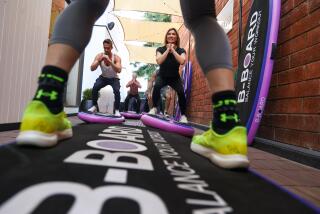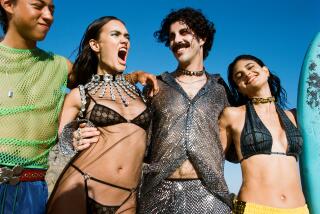Joe Wolfson; ‘Dr. 360’ Was Master of the Bodyboard
- Share via
“Dr. 360” had a remarkable ride.
Nicknamed for the spin he originated on the waves, Joe Wolfson of Manhattan Beach was a pioneer in the world of bodysurfing and bodyboarding, which he took to in the 1970s because he was too small for large surfboards. He became a master.
His legend grew when, facing terminal cancer, he spent his savings on others, left a note and $5,000 for a party and paddled out to sea to die. Comatose, he was rescued.
But on Monday, Wolfson was killed when his car veered off the Marina Freeway, went down an embankment and hit a tree. He was 50.
Kevin Cody, who wrote some of the early pieces on “Dr. 360” for his South Bay publication Easy Reader, recalled how Wolfson got his nickname.
“He would sit on a board and spin three, four or five times across the face of a wave,” Cody said. He was the first to do this maneuver, a 360.
Wolfson went on to win national and international competitions in the sport. He created his own bodyboard, which he sold at local surf shops.
Fearless in the water, he took on big, fast surf. And he was one of the first Americans to regularly surf Puerto Escondido, the Mexican pipeline.
“He gave it [the bodyboard] respectability by showing you could take off on big waves,” Cody said.
The life of the health-conscious Wolfson--he did not smoke or drink and was fit enough to stay in the water for up to 10 hours on his bodyboard--took a dramatic turn in early 1998. He was plagued by a persistent cough, and after an initial treatment for asthma and then sinus trouble, was finally diagnosed as having inoperable cancer.
He took a leave of absence from his job as a recreation official with the city of Carson, but his wide-ranging attempts at treatment didn’t work.
Wolfson devised a plan. He paddled his bodyboard about 150 yards off Manhattan Beach, tied up at a buoy and waited to die.
In the preceding months, he had drained more than $100,000 from his bank account doing things for others, including paying for a friend’s laser eye surgery and two years’ tuition at UC Berkeley for another friend’s son. He left a suicide note with a check for a party after his death.
But his plan went awry when lifeguard Tracy Geller noticed something bobbing in the water. Geller raced out on his board and began giving Wolfson mouth-to-mouth resuscitation. As he approached shore with the comatose Wolfson, Geller whistled to surfers near the shoreline for help.
After nearly six hours in 59-degree water, Wolfson’s temperature had dropped to 81 degrees, and he lay shivering for hours in a hospital.
But he still wanted to die.
Geller also had a hand in changing that. A teacher at the New Manhattan Beach Middle School, Geller urged the students in his physical education class to write to Wolfson. Most of the 33 letters gushed about Wolfson’s talent on the board and how he had become an inspiration to the kids on the beach.
“I didn’t really understand why I was alive until I read those letters,” Wolfson later told a Times reporter. “Then I said, ‘OK, you made a big mistake here.’ It was the worst message in the world I could send them.”
Wolfson’s own childhood began in Brooklyn, N.Y. He was the eldest of three children of Harry and Rhoda Wolfson, who were both union and labor activists.
The family moved to north Long Beach from Washington, D.C., in 1956. With their parents’ blessing, the children were bused to school in Compton, where Wolfson became student body president at Dominguez High School. By then, the beach and surfing consumed him.
While a student at UCLA, he moved to Manhattan Beach. He never left.
A celebration of his life will be held about 2:30 p.m. Monday near the lifeguard station at 23rd Street and Marine Avenue in Manhattan Beach.
He is survived by his parents and sisters, Paula and Ellen. The family said people are welcome to come and share stories about Dr. 360.
More to Read
Sign up for Essential California
The most important California stories and recommendations in your inbox every morning.
You may occasionally receive promotional content from the Los Angeles Times.













